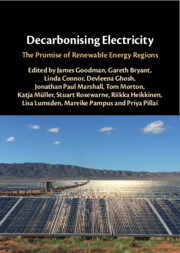6 - Comparative Analysis
Published online by Cambridge University Press: 20 June 2025
Summary
This chapter centres on comparative analysis, drawing together evidence-based insights into how renewable energy has been developed in the three regions. The three-part framework outlined in the opening chapter is used to analyse problems of legitimacy in renewable energy development in the three contexts. The three dimensions of appropriation, accumulation, and regulation shape the comparative analysis and underpin a suggested schema for interpreting legitimacy issues in renewable energy transitions. We discuss how renewables have been progressed, both locally and in terms of the intersecting dynamics of global policy, finance, and advocacy in constituting region-level transitions.
Information
- Type
- Chapter
- Information
- Decarbonising ElectricityThe Promise of Renewable Energy Regions, pp. 216 - 242Publisher: Cambridge University PressPrint publication year: 2025
References
Accessibility standard: Inaccessible, or known limited accessibility
Why this information is here
This section outlines the accessibility features of this content - including support for screen readers, full keyboard navigation and high-contrast display options. This may not be relevant for you.Accessibility Information
Content Navigation
Allows you to navigate directly to chapters, sections, or non‐text items through a linked table of contents, reducing the need for extensive scrolling.
Provides an interactive index, letting you go straight to where a term or subject appears in the text without manual searching.
Reading Order & Textual Equivalents
You will encounter all content (including footnotes, captions, etc.) in a clear, sequential flow, making it easier to follow with assistive tools like screen readers.
Visual Accessibility
You will still understand key ideas or prompts without relying solely on colour, which is especially helpful if you have colour vision deficiencies.
You benefit from high‐contrast text, which improves legibility if you have low vision or if you are reading in less‐than‐ideal lighting conditions.
Structural and Technical Features
You gain clarity from ARIA (Accessible Rich Internet Applications) roles and attributes, as they help assistive technologies interpret how each part of the content functions.
